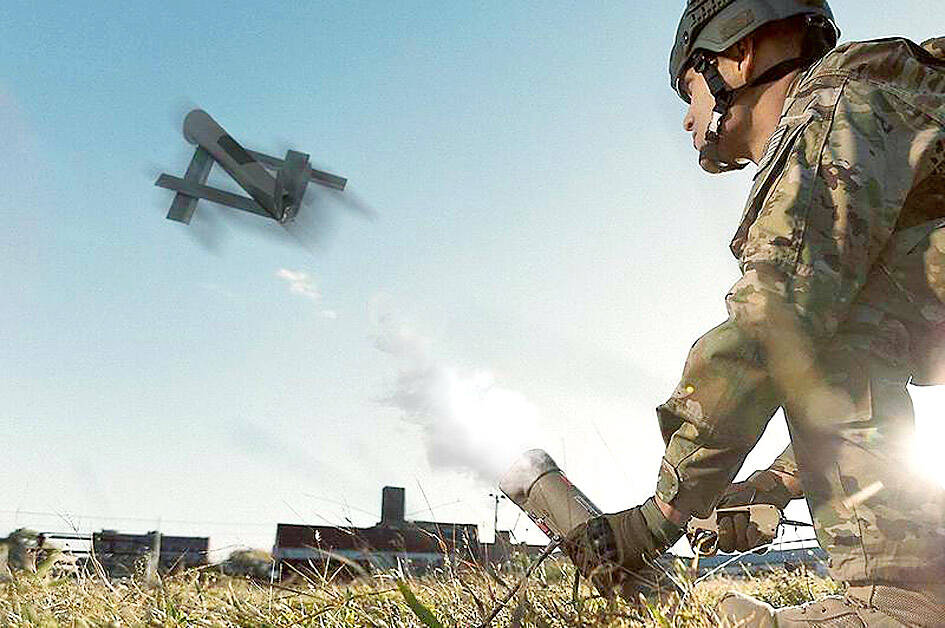The US Department of State has approved the sale of kamikaze drones and missiles to Taiwan for US$360 million, the US Defense Security Cooperation Agency said on Tuesday.
Included in the two separate packages are 720 Switchblade 300 loitering munitions and related equipment for an estimated cost of US$60.2 million, and 291 ALTIUS 600M-V drone systems and related equipment for an estimated cost of US$300 million, the agency said.
“The proposed sale will help improve the security of the recipient and assist in maintaining political stability, military balance and economic progress in the region,” it said in separate news releases announcing the sales.

Photo: Screen grab from AeroVironment’s Facebook page
Taipei had expressed interest in obtaining AeroVironment Switchblade loitering munitions or other devices with similar capabilities to enhance its asymmetric warfare capabilities, sources said last month.
Loitering munitions fly around an area until a target is located, then attack by crashing into it.
The Switchblade 300 is a tube-launched drone designed to attack ground troops, which Ukrainian forces have utilized extensively in their fight against Russia’s invasion.
The ALTIUS 600M-V is the warhead variant of the Anduril series of loitering munitions. It can be deployed from various platforms and in a networked swarm.
The Ministry of National Defense on X yesterday thanked Washington for the approval, saying it would “enhance our ability to meet current and future threats” in accordance with the Taiwan Relations Act and the “six assurances.”
In a separate statement, the ministry said that approval time was significantly expedited for the sales.
It thanked its US counterparts for their efforts to accelerate arms sales to Taiwan.
The US’ official approval of the sale of the weapons would bolster Taiwan’s self-defense capabilities, Presidential Office spokeswoman Kuo Ya-hui (郭雅慧) said.
The Presidential Office thanks the US government for observing the Taiwan Relations Act and the “six assurances,” and continuing to strengthen the Taiwan-US partnership to jointly uphold regional peace, Kuo said.
The combined package is the 15th authorized to Taiwan since the administration of US President Joe Biden took office in 2021, highlighting the US government’s emphasis on regional stability and peace, she said.
Taiwan would continue to augment its self-defense and asymmetrical warfare capabilities to defend and uphold its democratic and free government, she said.
Taiwan would also continue to work with like-minded countries to ensure that the Indo-Pacific region remains free and open to all, foster global peace, stability and prosperity, and contribute in a meaningful and benign manner, she added.
The Ministry of Foreign Affairs said that the US is working with like-minded partners to urge China to stop oppressing Taiwan, and undermining peace and stability in the Taiwan Strait.
Taiwan would continue to deepen Taiwan-US security partnerships, and work together to maintain a rules-based world order to foster stability, peace and prosperity in the Taiwan Strait and the Indo-Pacific region, the ministry said.

CHAOS: Iranians took to the streets playing celebratory music after reports of Khamenei’s death on Saturday, while mourners also gathered in Tehran yesterday Iranian Supreme Leader Ayatollah Ali Khamenei was killed in a major attack on Iran launched by Israel and the US, throwing the future of the Islamic republic into doubt and raising the risk of regional instability. Iranian state television and the state-run IRNA news agency announced the 86-year-old’s death early yesterday. US President Donald Trump said it gave Iranians their “greatest chance” to “take back” their country. The announcements came after a joint US and Israeli aerial bombardment that targeted Iranian military and governmental sites. Trump said the “heavy and pinpoint bombing” would continue through the week or as long

TRUST: The KMT said it respected the US’ timing and considerations, and hoped it would continue to honor its commitments to helping Taiwan bolster its defenses and deterrence US President Donald Trump is delaying a multibillion-dollar arms sale to Taiwan to ensure his visit to Beijing is successful, a New York Times report said. The weapons sales package has stalled in the US Department of State, the report said, citing US officials it did not identify. The White House has told agencies not to push forward ahead of Trump’s meeting with Chinese President Xi Jinping (習近平), it said. The two last month held a phone call to discuss trade and geopolitical flashpoints ahead of the summit. Xi raised the Taiwan issue and urged the US to handle arms sales to

BIG SPENDERS: Foreign investors bought the most Taiwan equities since 2005, signaling confidence that an AI boom would continue to benefit chipmakers Taiwan Semiconductor Manufacturing Co’s (TSMC, 台積電) market capitalization swelled to US$2 trillion for the first time following a 4.25 percent rally in its American depositary receipts (ADR) overnight, putting the world’s biggest contract chipmaker sixth on the list of the world’s biggest companies by market capitalization, just behind Amazon.com Inc. The site CompaniesMarketcap.com ranked TSMC ahead of Saudi Aramco and Meta Platforms Inc. The Taiwanese company’s ADRs on Tuesday surged to US$385.75 on the New York Stock Exchange, as strong demand for artificial intelligence (AI) applications led to chip supply constraints and boost revenue growth to record-breaking levels. Each TSMC ADR represents

Pro-democracy media tycoon Jimmy Lai’s (黎智英) fraud conviction and prison sentence were yesterday overturned by a Hong Kong court, in a surprise legal decision that comes soon after Lai was jailed for 20 years on a separate national security charge. Judges Jeremy Poon (潘兆初), Anthea Pang (彭寶琴) and Derek Pang (彭偉昌) said in the judgement that they allowed the appeal from Lai, and another defendant in the case, to proceed, as a lower court judge had “erred.” “The Court of Appeal gave them leave to appeal against their conviction, allowed their appeals, quashed the convictions and set aside the sentences,” the judges